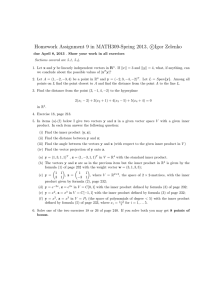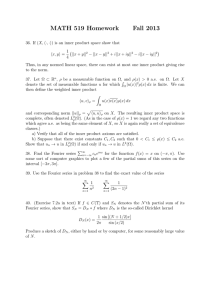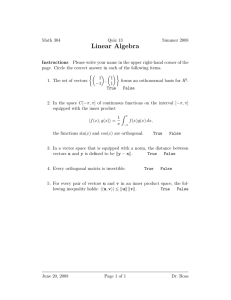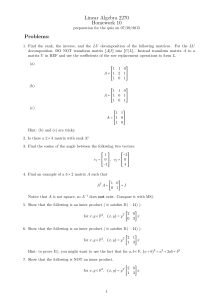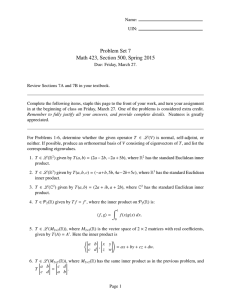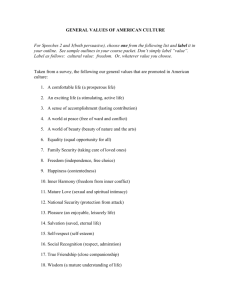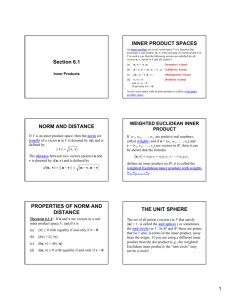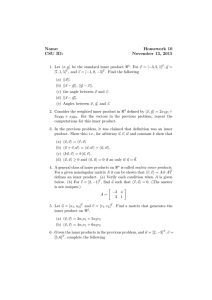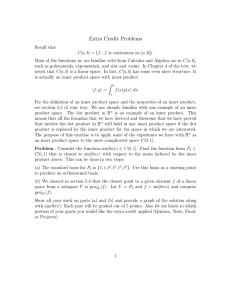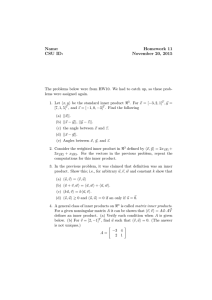Course 111: Algebra, 19th January 2007 1. Given u = (u
advertisement
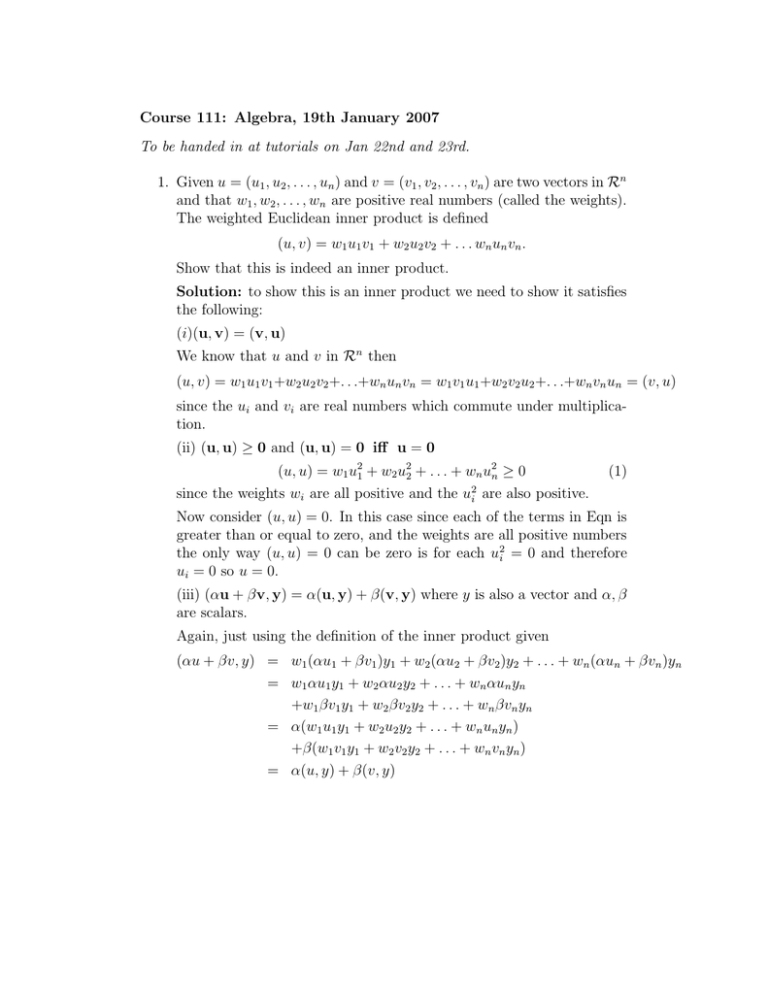
Course 111: Algebra, 19th January 2007 To be handed in at tutorials on Jan 22nd and 23rd. 1. Given u = (u1 , u2 , . . . , un ) and v = (v1 , v2 , . . . , vn ) are two vectors in Rn and that w1 , w2 , . . . , wn are positive real numbers (called the weights). The weighted Euclidean inner product is defined (u, v) = w1 u1 v1 + w2 u2 v2 + . . . wn un vn . Show that this is indeed an inner product. Solution: to show this is an inner product we need to show it satisfies the following: (i)(u, v) = (v, u) We know that u and v in Rn then (u, v) = w1 u1 v1 +w2 u2 v2 +. . .+wn un vn = w1 v1 u1 +w2 v2 u2 +. . .+wn vn un = (v, u) since the ui and vi are real numbers which commute under multiplication. (ii) (u, u) ≥ 0 and (u, u) = 0 iff u = 0 (u, u) = w1 u21 + w2 u22 + . . . + wn u2n ≥ 0 (1) since the weights wi are all positive and the u2i are also positive. Now consider (u, u) = 0. In this case since each of the terms in Eqn is greater than or equal to zero, and the weights are all positive numbers the only way (u, u) = 0 can be zero is for each u2i = 0 and therefore ui = 0 so u = 0. (iii) (αu + βv, y) = α(u, y) + β(v, y) where y is also a vector and α, β are scalars. Again, just using the definition of the inner product given (αu + βv, y) = w1 (αu1 + βv1 )y1 + w2 (αu2 + βv2 )y2 + . . . + wn (αun + βvn )yn = w1 αu1 y1 + w2 αu2 y2 + . . . + wn αun yn +w1 βv1 y1 + w2 βv2 y2 + . . . + wn βvn yn = α(w1 u1 y1 + w2 u2 y2 + . . . + wn un yn ) +β(w1 v1 y1 + w2 v2 y2 + . . . + wn vn yn ) = α(u, y) + β(v, y) as required. 2. Compute (u, v), ||u|| and d(u, v) for the following vectors and inner products • u = (2, −1, 4), v = (3, 2, 0) in R3 with the standard Euclidean inner product. (u, v) = (2)(3) + (−1)(2) + (4)(0) = 4 1 ||u|| = (u, u) 2 = q √ (2)2 + (−1)2 + (4)2 = d(u, v) = ||u−v|| = ||(−1, −3, 4)|| = q 21 (−1)2 + (−3)2 + (4)2 = √ 26 • u = (2, −1, 4), v = (3, 2, 0) in R3 with the weighted Euclidean inner product and w1 = 2, w2 = 6, w3 = 1/5. (u, v) = (2)(3)(2) + (−1)(2)(6) + (4)(0) 1 2 ||u|| = (u, u) = s (2)2 (2) + (−1)2 (6) + (4)2 d(u, v) = ||u−v|| = ||(−1, −3, 4)|| = 1 =0 5 1 = 5 s 86 √ = 17.2 5 s (−1)2 (2) + (−3)2 (6) + (4)2 1 = 5 s 296 5 • u = x, v = x2 in C[0, 1] the set of continous real-valued functions R1 on [0, 1] and an inner product, (f (t), g(t)) = 0 f (t)g(t)dt (u, v) = 1 2 Z ||u|| = (u, u) = 1 2 x(x )dx = 0 s Z Z 1 0 1 x(x)dx = 0 2 d(u, v) = ||u−v|| = ||x−x || = s Z 1 4 1 1 x dx = x = 4 0 4 3 s Z 1 x2 dx = 0 s 1 0 (x − x2 )dx = 1 1 3 1 x =√ 3 0 3 s 1 5 1 4 1 3 1 1 x − x + x =√ 5 2 3 30 0

